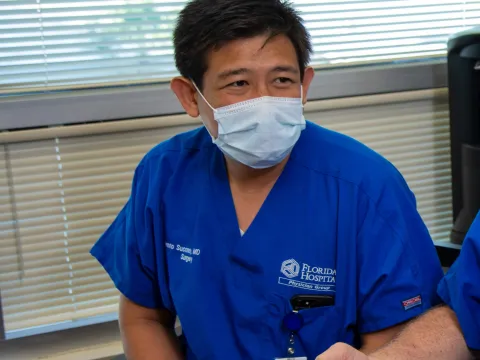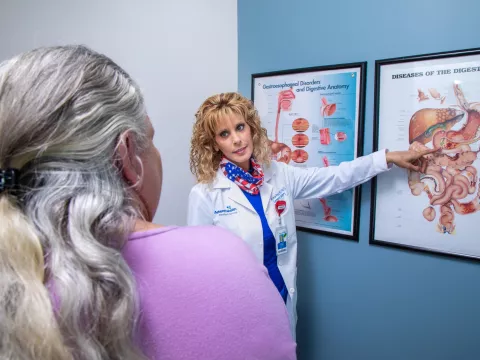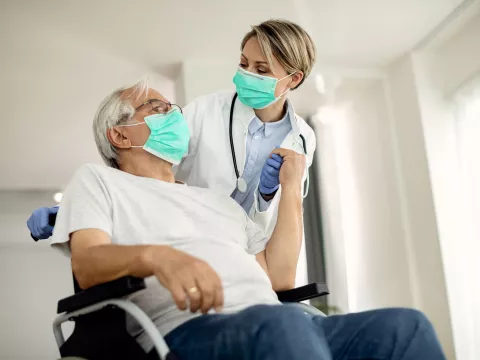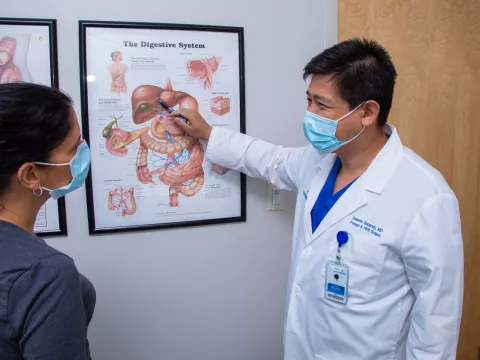- AdventHealth Digestive Health Institute
Choose the health content that’s right for you, and get it delivered right in your inbox.
In March, Iswanto Sucandy, MD, FACS, advanced HPB (liver, pancreas and bile duct) surgeon at the AdventHealth Digestive Health Institute (DHI), discussed robotic liver surgery at the 54th Annual Congress of the Korean Association of HPB Surgeons. Also known as “HPB Surgery Week 2021,” the conference was held in a hybrid model, with some participants meeting at the Grand Walkerhill Hotel in Seoul, Korea, and others contributing virtually.
Luckily for Dr. Sucandy, he did not have to arise in the wee hours of the morning – as he has in the past for international conferences – to give his talk. Because Seoul is 14 hours ahead of Tampa, Dr. Sucandy could present in the evening while his audience in Korea tuned in during the day.
The “Bring your Imagination into Reality” conference theme helped determine Dr. Sucandy’s topic. In his talk, “Institutional Experience and Clinical Outcomes of Robotic Major Hepatectomy for Liver Tumors,” Dr. Sucandy described the work that he, Alexander Rosemurgy, MD, FACS, and Sharona Ross, MD, FACS, advanced HPB and foregut surgeons, have done to offer major robotic liver surgery.
By using the da Vinci Surgical System, a surgical robot, Dr. Sucandy, Dr. Rosemurgy and Dr. Ross can turn very complicated operations into minimally invasive procedures. Instead of a large, abdominal incision a patient would need for an open operation, the da Vinci lets the DI advanced HPB surgeons operate through a few small openings. There are many benefits of this approach. These include less chance for surgical complications, less pain after surgery and a faster recovery.
Pioneering Robotic, Minimally Invasive Procedures for Major Liver Surgery
Dr. Sucandy explained that the current published literature about robotic liver surgery is nearly all about removing only a small portion of the liver – one or two segments. However, he, Dr. Rosemurgy and Dr. Ross also use the robotic system to complete major liver surgery. A liver resection, or removal of part of the liver, is considered “major” if it removes three or more adjacent segments of the liver.
Only the world’s most experienced centers in robotic liver surgery have attempted using the surgical robot for major liver operations. At the conference, Dr. Sucandy talked about data from DI’s first 142 patients who have had major liver resection with the surgical robot.
The average age of these patients was 63. Also, 4 in 5 of the patients had another underlying condition besides liver cancer. These conditions were most commonly high blood pressure (more than 1 in 3 patients) and diabetes (1 in 4 patients). Conditions like these can increase the chances of having a complication after surgery. However, the DI surgeons found that they had very good results from using the da Vinci robot for major livery surgery.
Major Liver Robotic Surgery Outcomes at Digestive Health Institute
The average operation took about six hours. Of the 142 patients, the surgeons were able to complete the robotic operation without having to change to an open procedure in all but two cases.
Dr. Sucandy described robotic liver surgery as “quite bloodless.” This is because the surgical robot is equipped with special tools that seal off blood vessels as surgeons make internal incisions. The result is that very little bleeding occurs. Ultimately, the amount of blood loss patients experienced varied depending on which liver segments were removed. However, the average was about 200mL. That's less than 7 oz and less than half of the amount of blood taken out when you donate blood.
After their robotic liver operations, patients had to stay in the hospital for about a four- or five-day recovery. This is better than the usual five to 10 day stay needed after an open liver operation. Complications after surgery occurred in just 3 in 50 patients. Also, only about 1 in 7 patients had to be readmitted to the hospital, for any reason, within 30 days of their procedures.
Safe and Effective Robotic Major Liver Resection Is Possible at Digestive Health Institute
Dr. Sucandy concluded that not only is major robotic hepatectomy possible, it is a safe operation. However, it’s important that patients seek out an experienced center that’s capable of offering major liver resection this way. He mentioned that there is a learning curve. Surgeons who want to perform major liver surgery need to start small. By getting good at robotic minor liver resections, they can gradually attempt larger and more complex liver operations with the surgical robot.
In the meantime, patients who would be well-served by a minimally invasive, major liver operation should talk to the advanced HPB surgeons at the Digestive Health Institute.
If you are looking for minimally invasive surgery for a liver tumor or other digestive cancer, see one of our advanced HPB surgeons. Call us at
Call844-650-5950 to set up a surgical consultation.





